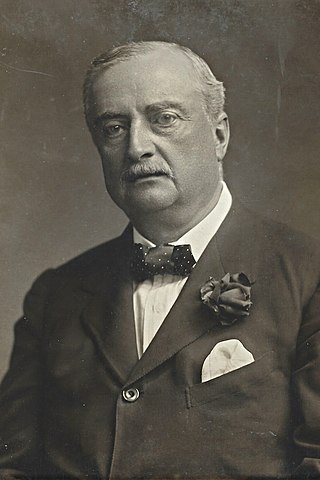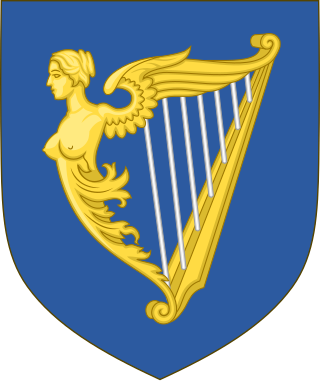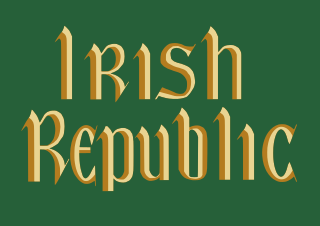Related Research Articles

John Edward Redmond was an Irish nationalist politician, barrister, and MP in the House of Commons of the United Kingdom. He was best known as leader of the moderate Irish Parliamentary Party (IPP) from 1900 until his death in 1918. He was also the leader of the paramilitary organisation the Irish National Volunteers (INV).

The Irish state came into being in 1919 as the 32 county Irish Republic. In 1922, having seceded from the United Kingdom of Great Britain and Ireland under the Anglo-Irish Treaty, it became the Irish Free State. It comprised 26 counties with 6 counties under the control of Unionists which became Northern Ireland in 1921. Bunreacht na hÉireann 1937 constitution renamed the 26 states 'Ireland'. In 1949, only 26 counties explicitly became a republic under the terms of the Republic of Ireland Act 1948, definitively ending its tenuous membership of the British Commonwealth. In 1973 the Republic of Ireland joined the European Communities (EC) as a member state which would later become the European Union (EU).

Irish nationalism is a nationalist political movement which, in its broadest sense, asserts that the people of Ireland should govern Ireland as a sovereign state. Since the mid-19th century, Irish nationalism has largely taken the form of cultural nationalism based on the principles of national self-determination and popular sovereignty. Irish nationalists during the 18th, 19th, and 20th centuries such as the United Irishmen in the 1790s, Young Irelanders in the 1840s, the Fenian Brotherhood during the 1880s, Fianna Fáil in the 1920s, and Sinn Féin styled themselves in various ways after French left-wing radicalism and republicanism. Irish nationalism celebrates the culture of Ireland, especially the Irish language, literature, music, and sports. It grew more potent during the period in which all of Ireland was part of the United Kingdom, which led to most of the island gaining independence from the UK in 1922.

The Irish Parliamentary Party was formed in 1874 by Isaac Butt, the leader of the Nationalist Party, replacing the Home Rule League, as official parliamentary party for Irish nationalist Members of Parliament (MPs) elected to the House of Commons at Westminster within the United Kingdom of Great Britain and Ireland up until 1918. Its central objectives were legislative independence for Ireland and land reform. Its constitutional movement was instrumental in laying the groundwork for Irish self-government through three Irish Home Rule bills.

Irish republicanism is the political movement for the unity and independence of Ireland under a republic. Irish republicans view British rule in any part of Ireland as inherently illegitimate. An ideology since the 17th century, various methods have been employed to achieve the republic, including rebellions and paramilitary campaigns. Although the makeup of republicanism has included multiple creeds, its relation to catholicism increasingly became central.

United Ireland, also referred to as Irish reunification or a New Ireland, is the proposition that all of the island of Ireland should be a single sovereign state. At present, the island is divided politically: the sovereign state of Ireland has jurisdiction over the majority of Ireland, while Northern Ireland, which lies entirely within the Irish province of Ulster, is part of the United Kingdom. Achieving a united Ireland is a central tenet of Irish nationalism and Republicanism, particularly of both mainstream and dissident republican political and paramilitary organisations. Unionists support Northern Ireland remaining part of the United Kingdom and oppose Irish unification.
The Nationalist Party was a term commonly used to describe a number of parliamentary political parties and constituency organisations supportive of Home Rule for Ireland from 1874 to 1922. It was also the name of the main Irish nationalist Nationalist Party in Northern Ireland from 1921 to 1978.

The Irish Unionist Alliance (IUA), also known as the Irish Unionist Party, Irish Unionists or simply the Unionists, was a unionist political party founded in Ireland in 1891 from a merger of the Irish Conservative Party and the Irish Loyal and Patriotic Union (ILPU) to oppose plans for home rule for Ireland within the United Kingdom of Great Britain and Ireland. The party was led for much of its existence by Colonel Edward James Saunderson and later by St John Brodrick, 1st Earl of Midleton. In total, eighty-six members of the House of Lords affiliated themselves with the Irish Unionist Alliance, although its broader membership among Irish voters outside Ulster was relatively small.
Abstentionism is the political practice of standing for election to a deliberative assembly while refusing to take up any seats won or otherwise participate in the assembly's business. Abstentionism differs from an election boycott in that abstentionists participate in the election itself. Abstentionism has been used by Irish republican political movements in the United Kingdom and Ireland since the early 19th century. It was also used by Hungarian and Czech nationalists in the Austrian Imperial Council in the 1860s.

The partition of Ireland was the process by which the Government of the United Kingdom of Great Britain and Ireland (UK) divided Ireland into two self-governing polities: Northern Ireland and Southern Ireland. It was enacted on 3 May 1921 under the Government of Ireland Act 1920. The Act intended both territories to remain within the United Kingdom and contained provisions for their eventual reunification. The smaller Northern Ireland was duly created with a devolved government and remained part of the UK. The larger Southern Ireland was not recognised by most of its citizens, who instead recognised the self-declared 32-county Irish Republic. On 6 December 1922 Ireland was partitioned. At that time the territory of Southern Ireland left the UK and became the Irish Free State, now known as the Republic of Ireland.
The Irish Anti-Partition League (APL) was a political organisation based in Northern Ireland which campaigned for a united Ireland from 1945 to 1958. The organisation aimed to unite Irish nationalists, filling the void left by nationalist groups that had become inactive in the decade prior. At its peak, the League had around 3,500 members. There was significant internal debate about whether candidates should participate in the British Parliament. In the mid-1950s, most abstentionists had left the organisation. Dwindling membership meant that by 1956, no candidates were nominated for committee elections. The organisation remained inactive until 1958, when a final meeting was held to distribute remaining funds. The League was succeeded by National Unity in 1959.

The All-for-Ireland League (AFIL) was an Irish, Munster-based political party (1909–1918). Founded by William O'Brien MP, it generated a new national movement to achieve agreement between the different parties concerned on the historically difficult aim of Home Rule for the whole of Ireland. The AFIL established itself as a separate non-sectarian party in the House of Commons of the United Kingdom of Great Britain and Ireland, binding a group of independent nationalists MPs to pursue a broader concept of Irish nationalism, a consensus of political brotherhood and reconciliation among all Irishmen, primarily to win Unionist consent to an All-Ireland parliamentary settlement.

Cahir Healy was an Irish politician.
The Nationalist Party was the continuation of the Irish Parliamentary Party (IPP), and was formed after the partition of Ireland, by the Northern Ireland-based members of the IPP.
James O'Reilly, also known as Seamas O'Reilly, (1916–1992) was a nationalist politician in Ireland.
Patrick Francis McGill (1913–1977) was a journalist and nationalist politician in Ireland.
National Unity was an Irish nationalist political study group in Northern Ireland.
The Irish Dominion League was an Irish political party and movement in Britain and Ireland which advocated Dominion status for Ireland within the British Empire, and opposed partition of Ireland into separate southern and northern jurisdictions. It attracted modest support from middle-class Dubliners of moderate unionist and nationalist backgrounds, anxious to achieve a compromise in the face of the escalating conflict between the Irish Republican Army and the British. It operated between 1919 and 1921.
The Unionist Anti-Partition League (UAPL) was a unionist political organisation in Ireland which campaigned for a united Ireland within the United Kingdom. Led by St John Brodrick, 1st Earl of Midleton, it split from the Irish Unionist Alliance on 24 January 1919 over disagreements regarding the partition of Ireland.
The Friends of Ireland was a group of British Labour Party Members of Parliament in support of the ending of the partition of Ireland.